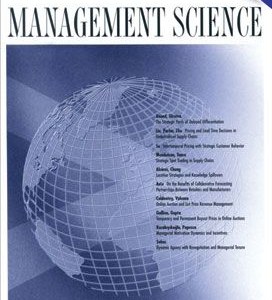
Bleichrodt, H., Schmidt, U. and Zank, H. (2009). Additive utility in prospect theory Management Science, 55(5):863--873.
-
Affiliated author
-
Publication year2009
-
JournalManagement Science
Prospect theory is currently the main descriptive theory of decision under uncertainty. It generalizes expected utility by introducing nonlinear decision weighting and loss aversion. A difficulty in the study of multiattribute utility under prospect theory is to determine when an attribute yields a gain or a loss. One possibility, adopted in the theoretical literature on multiattribute utility under prospect theory, is to assume that a decision maker determines whether the complete outcome is a gain or a loss. In this holistic evaluation, decision weighting and loss aversion are general and attribute-independent. Another possibility, more common in the empirical literature, is to assume that a decision maker has a reference point for each attribute. We give preference foundations for this attribute-specific evaluation where decision weighting and loss aversion are depending on the attributes. [ABSTRACT FROM AUTHOR]